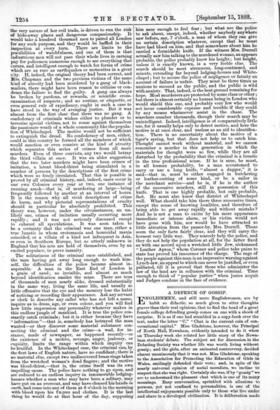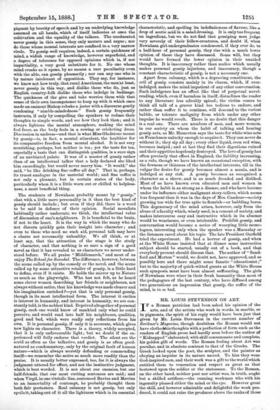A DEFENCE OF GOSSIP.
ENGLISHMEN, and still more Englishwomen, are by
habit so didactic, so much given to utter thoughts graver than their real opinions, that to find the head of a great female college defending gossip comes on one with a shock of surprise. It is as if one had stumbled in a copy-book over the text, under the letter " C," " Chat is the current coin of con- versational capital" Miss Gladstone, however, the Principal of North Hall, Newnham, evidently intended to do it when on Thursday week she related her little story of the Newn- ham students' debate. The subject set for discussion in the Debating Society was whether life was worth living without gossip ; and the girls, after an animated controversy, decided almost unanimously that it was not. Miss Gladstone, speaking to the Association for Promoting the Education of Girls in Wales, smilingly defended their vote ; and, in spite of the nearly universal opinion of social moralists, we incline to suspect that she was right. Certainly she was, if by " gossip " we are to understand the pleasant chat which is one of its many meanings. Easy conversation, sprinkled with allusions to persons, yet not confined to personalities, is one of the intellectual enjoyments possible only to those who live under and share in a developed civilisation. It is deliberation made
piquant by brevity of speech and by an underlying knowledge assumed on all hands, which of itself indicates at once the cultivation and the equality of the talkers. The uneducated never gossip in this sense, they only narrate and argue ; nor do those whose mental interests are confined to a very narrow circle. To gossip well requires, indeed, a certain quickness of mind, a widish range of knowledge, however superficial, and a degree of tolerance for opposed opinions which is, if not impartiality, a very good. substitute for it. No one whose mind creaks as it opens, by no means a rare peculiarity even, with the able, can gossip pleasantly ; nor can any one who is by nature intolerant of opposition. They say, for instance, we know not how truly, that rural Americans, the men at least, never gossip in this way, and dislike those who do, just as. English country-folk dislike those who indulge in badinage. The quickness of the give and take worries them with that sense of their own incompetence to keep up with it which once made an eminent Bishop rebuke a jester with a discourse gently condoning " nimble-mindedness." Such gossip frequently instructs, if only by compelling the speakers to reduce their thoughts to simple words, and see how they look then; and it always lightens the mental atmosphere, making the mind feel freer, as the body feels in a rowing or cricketing dress. Discussion in undress—and that is what Miss Gladstone meant by gossip—is, in fact, a mental stimulant, the healthier for its comparative freedom from mental alcohol. It is not very nourishing, perhaps, but neither is tea; yet the taste for tea, especially a taste that can distinguish qualities, is a sure sign of an unvitiated palate. It was of a master of gossip rather than of an intellectual talker that a lady declared she liked him exceedingly, but would never marry him. "It would," she said, " be like drinking fine coffee all day." That is, perhaps, its truest analogue in the material world; and fine coffee is not only a pleasant, but in certain states of the body, particularly when it is a little worn out or chilled to helpless- ness, a most beneficial thing.
The students of Newnham probably meant by " gossip," chat with a little more personality in it than the best kind of gossip should include ; but even if they did, there is a word to be said in defence of their opinion. Social moralists habitually rather underrate, we think, the intellectual value of discussion of one's neighbours. It is beneficial to the brain, if not to the heart. It is the way in which the many who do not discern quickly gain their insight into character ; and even to those who need no such aid, personal talk may have a charm not necessarily unhealthy. We all think, or at least say, that the attraction of the stage is the study of character, and that nothing is so sure a sign of a good novel as that it has revealed to us characters we never under- stood before. We all praise " Middlemarch," and most of us enjoy The School for Scandal. The difference, however, between the scene called up by the comedy or the novel, and the scene called up by, some attractive retailer of gossip, is a little hard to define, even if it exists. He holds the mirror up to Nature as much as the playwright. Who has not felt, as he heard some clever women describing her friends or neighbours, not always without satire, that his knowledge was made clearer and his imagination enriched P--yet that is only personal gossip, though in its most intellectual form. The interest it excites is interest in humanity, and interest in humanity, we are con- stantly told, is the noblest kind. Deprived altogether of personal gossip, each one would know of mankind only what he could perceive, and would read into half his neighbours, qualities, good and bad, which were really only reflections from his own. It is personal gossip, if only it is accurate, which gives new lights on character. There is a theory, widely accepted, that it is only unfavourable light ; but we doubt if the ex- perienced will fully endorse that verdict. The silent are the acrid as often as the talkative, and gossip is as often good- natured as condemnatory, only by the original fault of human nature—which is always secretly defending or commending itself—we remember the satire so much more readily than the praise. It is usually better expressed, too, for it is always the judgment uttered for effect, and not the instinctive judgment, which is best worded. It is not about our enemies, but our half-friends, that our most cutting sentences are said ; and when Virgil, in one vitriolic line, sentenced Bavius and limvius to an immortality of contempt, he probably thought them both fair poetasters. Real calumny is not gossip, but only spoils it,.taking out of it all the lightness which is its essential
characteristic, and spoiling its indefiniteness of flavour, like a drop of acetic acid in a salad dressing. It is only too frequent an ingredient, but we do not find that gossiping men judge very severely of their fellow-creatures, and doubt if, when Newnham girl-undergraduates condescend, if they ever do, to a half-hour of personal gossip, they rise with a much lower opinion of those they have discussed. Some will, but they would have formed the lower opinion in their unaided thoughts.. It is inaccuracy rather than malice which usually makes personal gossip injurious, and inaccuracy, though a constant characteristic of gossip, is not a necessary one.
Apart from calumny, which is a, depraving constituent, the evil of gossip consists mainly in its charm, which, if over- indulged, makes the mind impatient of any other conversation.. Such indulgence has an effect like that of perpetual novel- reading, which, even if harmless in itself, disinclines the reader to any literature less adroitly spiced; the victim comes to think all talk of a graver kind too tedious to endure, and rather than suffer it to continue, will descend to the veriest babble, or tolerate malignity from which under any other impulse he would revolt. There is no doubt that this danger is a real one. There are numbers of men, and more women, in our society on whom the habit of talking and hearing gossip acts, as Mr. Hamerton says the taste for white wine acts.• on Frenchmen unlucky enough to acquireit. They can never do without it; they sip all day; every other liquid, even red wine, becomes insipid ; and at last they find their digestions ruined and their appetites hopelessly destroyed. The love of gossip has often precisely that effect in England, the liability increasing, as a rule, though we have known an occasional exception, with the fewness or thinness of the intellectual interests, till in the vulgar the desire for gossip becomes almost a mania, and is indulged at any risk. A gossip becomes as recognised a. character as a shrew, and is as much dreaded and disliked. Most of us have known even educated men and women in whom the habit is as strong as a disease, and who have become under its influence either malignant story-tellers, which seems less frequent than it was in the days of Mrs. Candour—society growing too wide for true spite to flourish—or babbling bores. This degeneracy of the mind arises, however, only from the abuse of a faculty which, wisely used, is a cement of society, and makes intercourse easy and instructive which in its absence would be wearisome, or even intolerable. Prohibit gossip, and conversation would become a series of wearying little mono- logues, interesting only when the speaker was a Macaulay or the listeners cared about his topic. The late President Garfield tried the experiment. He had a horror of gossip, and when at the White House insisted that at dinner some instructive subject should be started, usually out of a book, and that everybody present should discuss that. The author of " Sand- ford and Merton" would, we doubt not, have approved, and so possibly here and there might some fanatic " educationist ;" but to the majority of quick-witted guests at the White House such symposia must have been almost suffocating. The girls of Newnham were wiser in their fresh humanity than most of the pedagogues of the last century, who have diffused among two generations an impression that gossip, the coffee of the mind, is in se bad.



































 Previous page
Previous page